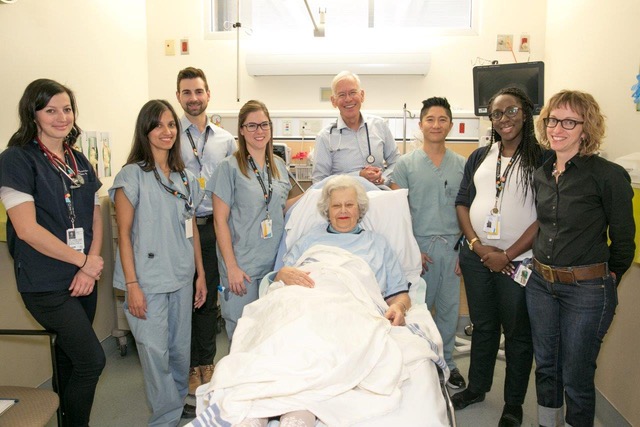Leadership-Backed Transformation
About Schwartz-Reisman Emergency Centre
A downtown core urban centre
- 65,000 ED visits per year all ages
- 13,000 ED visits per year for those over 65
- 8,200 ED visits per year for those over 75
- Not a trauma centre
- Located in downtown Toronto, Canada
Needs Goals and Motivations
Our move towards being a senior-friendly ED has been a project of more than 15 years. It has been an organic approach to system transformation – i.e. one little change at a time leading to bigger changes. Our hospital and ED have a commitment to vulnerable populations. As a downtown core urban centre, we have a strong mission to the homeless, substance users, people with mental illness. Fortunately, nearly a decade ago, the hospital’s board of governors established that one of the hospital’s strategic priorities was to provide excellent care to our aging population – all levels of the hospital are committed to improving care of older people.
In the ED, we identified older people as part of our core population early on, even before the past ten years as their numbers increased. Our ED leadership sees what should be clear to everyone – that, as the numbers of older medically and socially complex people increase in our communities, EDs must develop a new approach to their care. If we just keep doing things the same as we always have, we risk grinding the system to a halt AND providing inadequate care to this large population.
Solutions
We have slowly developed a whole suite of interventions that have changed the way we provide care to older ED patients:
- Introducing an interdisciplinary team of social worker, physiotherapist, and occupational therapists to address the social and functional challenges to effective disposition;
- Developing a process to hold older patients for access to that interdisciplinary team in the ED thus avoiding many admissions;
- Adding a Geriatric Emergency Management nurse role, an advanced practice RN, to complete more comprehensive assessments on selected older patients to promote durable discharges by linking with community resources;
- Enhancing the staff’s awareness of geriatric ED issues through encouraging both MDs and RNs to complete geri-EM.com modules;
- Developing our relationship with the inpatient geriatric psychiatry and palliative care services so that patients can access those assessments in the ED without needing to be admitted;
- Creating order sets and checklists (e.g. transfer back to long-term care or assessment of delirium or management of hip fracture) that are specific to older patient care needs
- Improving transitions of care of older people by co-locating a community services representative in the ED; by working closely with geriatric medicine to facilitate referral to follow up Falls, Memory, and Geriatric Assessment clinics; by developing a pathway for direct referral to our sister Rehabilitation hospital without the need for hospital admission
- Developing a team of specially trained geriatric-focussed ED volunteers to enhance the experience of older patients in the ED https://www.youtube.com/watch?v=twoEBP-OLhk
Outcomes
Perhaps one of the greatest outcomes has been a change in culture and attitude around the care of older people. No matter how complex the older person’s presentation may be, the ED staff generally feel that there is a patient-centred solution available: by using our team approach we can resolve many problems without needing to admit the patient. Quantifiably, our ED’s admission rate for patients over 65 is on average 10% less than our peer hospitals in our system (26.8% vs 38%) representing 1,620 admissions avoided annually. Finally, our approach has enhanced our reputation in our community, both locally and nationally; and allowed us to become a training centre for a Geriatric EM Fellowship https://www.sremi.ca/geriatric-emergency-medicine-fellowship.
 The Mount-Sinai Shwartz-Reisman Emergency Centre GED Team
The Mount-Sinai Shwartz-Reisman Emergency Centre GED Team